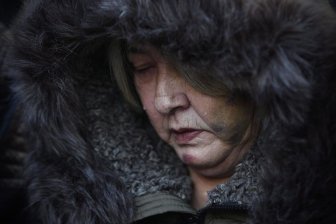Toronto police officers who die by suicide will now be allowed to have their names included on the force’s memorial wall honouring officers who died in the line of duty, if certain conditions are met.

The development comes after the force settled a case with the Ontario Human Rights Commission, which filed an application with the Human Rights Tribunal of Ontario over the matter in 2015.
The commission alleged that excluding names from the memorial wall of officers who died as a result of mental health injuries experienced in the line of duty was discriminatory.
READ MORE: National memorial pays tribute to five Canadian officers killed while on duty
“We got involved in this case because it was a practical way of demonstrating the persistent stigma facing first responders who suffered from mental health disabilities,” said Renu Mandhane, chief commissioner with the Ontario Human Rights Commission.
“We hope this signals to officers that if they are suffering, they can and should get help and that doesn’t mean they wouldn’t be worthy of honour and respect as an officer.”
Under terms of the settlement, Toronto police have until Oct. 31 to develop a procedure to ensure that any officer, regardless of how they died, be eligible for recognition on the memorial wall if they meet specific criteria. That procedure will be developed with a commission-approved expert in mental health disability and post-traumatic stress disorder in first responders.
“Today’s agreement creates an opportunity for the service to respectfully recognize those who have died, regardless of cause of death, by appropriately commemorating those who, through their actions, demonstrated the noble qualities of policing and inspired those who continue to serve,” said Toronto police spokeswoman Meaghan Gray.
Toronto police chief Mark Saunders declined to comment.
READ MORE: 8 deaths so far in 2016: Canada’s first responder PTSD crisis
Officers who have already died by suicide will also be up for consideration on the wall.
The settlement closes the chapter on a long battle by one family to have an officer’s name placed on the memorial wall.
Toronto police Staff Sgt. Eddie Adamson killed himself in 2005, about 25 years after witnessing the murder of his colleague during a robbery that turned into a hostage taking.
In 1980, Adamson was among a number of officers outside a Toronto bar where two men held patrons hostage and shot Const. Michael Sweet.
Sweet was further attacked by the two men and Adamson could no longer stand by, so against his superior’s orders, he stormed inside with a few other officers. During a shootout, police took the two men down. Adamson began mouth-to-mouth resuscitations on Sweet, but the officer died.
READ MORE: 13 first responders, 13 suicides, 10 weeks
Adamson’s daughter said her father would have nightmares about what happened and would wake screaming in the middle of the night.
In 2005, well after retiring from the force, Adamson checked into a motel in Orillia, Ont., and began drinking while poring over his notebooks of Sweet’s murder. He then pulled out a gun and shot himself in the head.
His family then began its lengthy journey to have Adamson’s name recognized alongside others who died from a physical injury in the line of duty.
The Adamsons successfully fought to have the Workplace Safety and Insurance Board change his cause of death from suicide to PTSD. But they couldn’t convince Toronto police to put his name on their “Wall of Honour.”
In 2013, the family filed an application to the Human Rights Tribunal of Ontario, alleging the current practice of allowing only officers who died as a result of a physical injury be placed on the memorial wall was discriminatory.
READ MORE: 6 months, 23 first responder suicides – what are we doing to help?
But the application was dismissed, with the tribunal saying Adamson’s estate didn’t have standing because they couldn’t claim discrimination after he died.
RELATED COMMENTARY: Assisted suicide is an affront to mental illness, not a cure
The Ontario Human Rights Commission then used an extraordinary power to launch its own human rights application against Toronto police because it raised issues in the public interest, Mandhane said.
“It’s very hard to litigate workplace culture, but the memorial wall in many ways is symbolic of that historic police culture that saw any mental health disability as a sign of weakness and unsuitability for the job,” Mandhane said.
“I want everyone to know that the Adamsons’ bravery and persistence will have an impact going forward in terms of breaking down that stigma.”
There have been 44 police officers who have killed themselves in Canada since 2014, according to data collected by the Tema Conter Memorial Trust, a charity that supports the mental health of first responders, correctional officers and military members.
If you or someone you know is in crisis and needs help, resources are available. In case of an emergency, please call 911 for immediate help.
The Canadian Association for Suicide Prevention, Depression Hurts and Kids Help Phone 1-800-668-6868 all offer ways for getting help if you, or someone you know, is suffering from mental health issues.



Comments